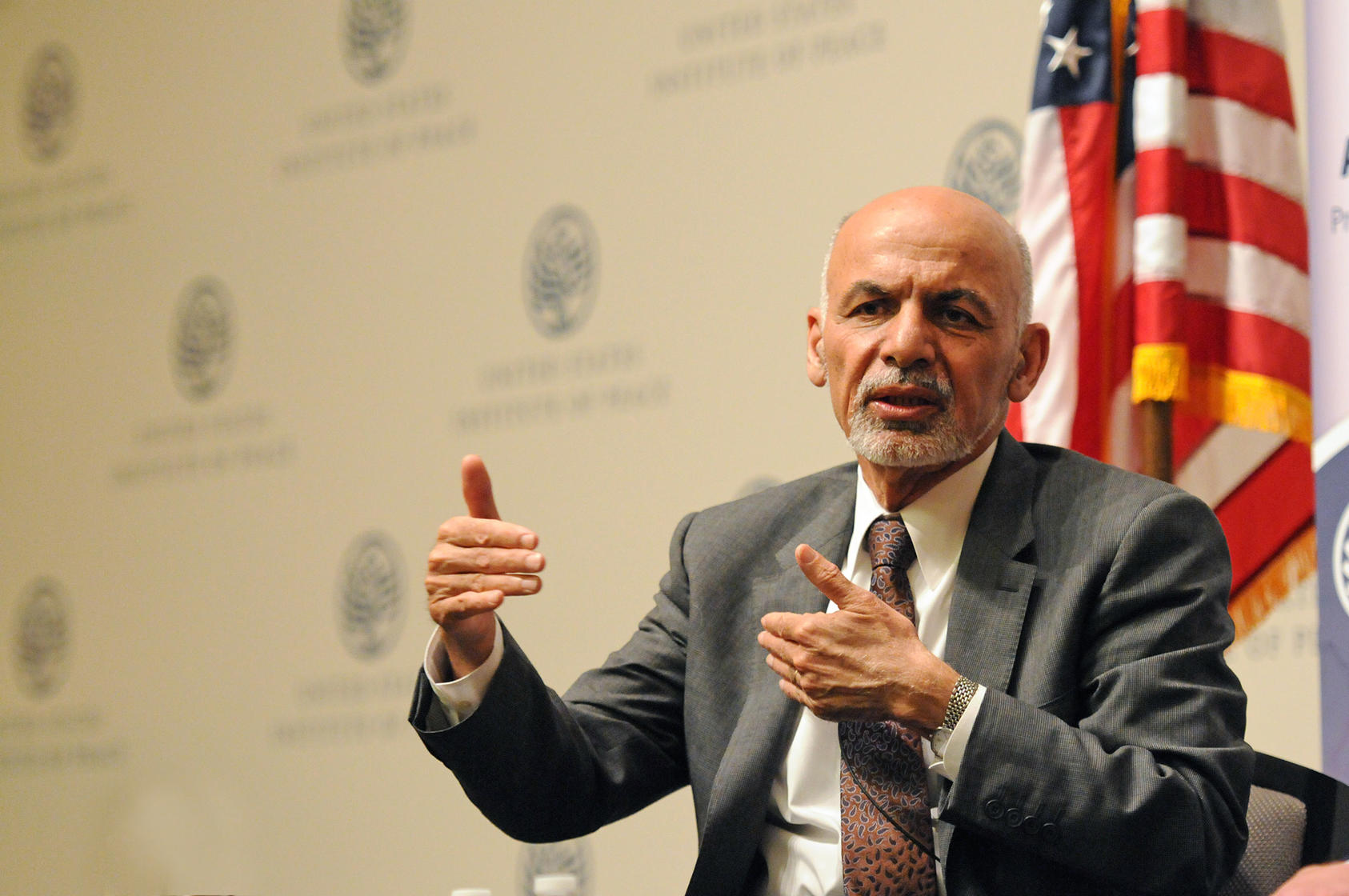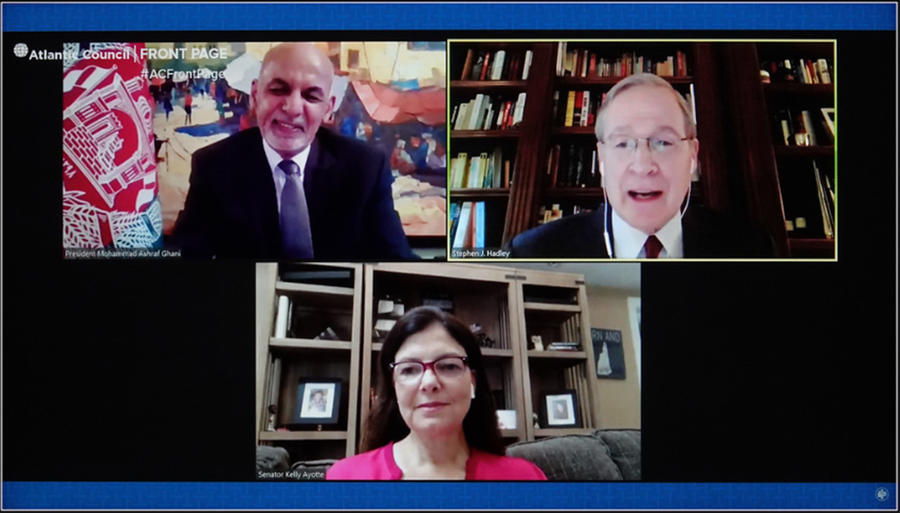Afghan President Ghani: Freeing Prisoners Can Speed Peace Talks
Ghani Offers to Release 5,000 Taliban, Asks Reciprocity to Prepare a Peace Process
Afghanistan’s government is accelerating its release of thousands of Taliban prisoners as a step toward peace talks, President Ashraf Ghani told an online audience today. The number of prisoners freed should now surpass 3,000, Ghani said, announcing that 2,000 more will be released “within a very short period.” That move, taking the total of freed Taliban fighters to 5,000, would fulfill a central Taliban pre-condition for peace talks. Ghani voiced optimism that a rare “window of opportunity” has opened for peace negotiations, but said further steps are vital to seize the chance to end the nation’s 40-plus years of warfare.

Following his latest talks with officials from the United States, Pakistan and Qatar, Ghani expressed hope that “next week we should be able to inform the world of the next step” in peace efforts. He spoke from Kabul in an online discussion hosted by USIP and the Washington-based Atlantic Council.
“President Ghani’s optimistic tone reflects significant progress over the past several weeks” said Scott Worden, USIP’s director for Afghanistan. After Taliban violence increased in April, “we saw a series of atrocious attacks by ISIS against Afghan civilians that nearly derailed the peace process,” he noted. “But then a three-day cease-fire in May, over the Eid al-Fitr holiday, reduced violence and led the government and the Taliban closer to talks.”
That cease-fire came just days after Ghani and his rival in last September’s presidential election, Abdullah Abdullah, reached a power-sharing arrangement following Ghani’s disputed victory in the vote. “Resolving that political impasse was a significant breakthough,” said Worden. In the discussion, Ghani’s described “cooperation between him and Dr. Abdullah on a common approach to peace that significantly strengthens the government’s negotiating hand,” said Worden. Together, the truce and the Ghani-Abdullah accord could prove to have been a turning point in hopes for peacemaking, according to another USIP Afghanistan analyst, Scott Smith.
Ghani: Taliban Must Reciprocate
Ghani’s statements represented an acceptance of the February 29 agreement reached by U.S. and Taliban negotiators. That negotiation—from which the Afghan government was excluded at the Taliban’s insistence—called for 5,000 Taliban and 1,000 government troops or police to be freed by March 10.
Ghani insisted that the government’s accelerated pace of prisoner releases must be reciprocated by the Taliban, which he said has been unclear even about how many government troops and police they are holding prisoner. This “issue needs to be highlighted,” he said. “The members of the Afghan security and defense forces that have been imprisoned by the Taliban have not been completely released. It’s important that the commitment, because this is a mutual commitment, is fulfilled.”
Now, Ghani said, the Taliban are inconsistent about how many government prisoners they hold. “They claimed 1,000; the number keeps shifting,” he said. “We need clarity regarding the fate of those [prisoners] that are with them and assurance that the last person remaining with them is released.
Under the U.S.-Taliban agreement, the Taliban have stopped attacking U.S. troops but are continuing to attack Afghan government forces and civilians. “There has been …[a] reduction of violence,” Ghani said, “but the casualty figures still average around 60 to 70 a day. The number of fatalities, unfortunately, are averaging 30. It’s extremely important for public support that [violence] reduction reaches the maximum effect, and also that we ensure that irreconcilables and spoilers are not given an opportunity.”
Among the key points in Ghani’s discussion were these:
- Conciliatory language on Pakistan. Ghani noted a visit to Kabul this week by the military commander of neighboring Pakistan, General Qamar Javed Bajwa. While Pakistani officials routinely voice formal support for Afghan peace and independence, Pakistan historically has offered a sanctuary for the Taliban and Pakistani relations with the Afghan government have been strained. “We feel that we have come to the closest alignment with Pakistan in terms of discourse,” Ghani said, and “we hope that we will be able to turn this into opportunity for alignment.” He added that he and Bajwa “both agreed that country is developed within regions and the immense opportunity that India presents is extremely important.” Because Pakistan sees India, to its east, as its greatest security threat, Pakistani leaders historically have been suspicious of close Indian ties with Afghanistan.
- Ghani’s message for Congress and Americans. Ghani took a question from former U.S. Senator Kelly Ayotte, who co-chairs the Afghanistan Study Group. The group, facilitated by USIP, is conducting a congressionally mandated review of the Afghan peace process and its implications for U.S. interests. Ayotte noted skepticism among many Americans about the value of U.S. help for Afghanistan. Ghani noted that American defense and security officials typically describe to him U.S. interest in Afghanistan as protection against the risks of terrorism that can arise from poorly governed regions. “You have no obligation to us,” he said. “You fulfilled your moral obligation, both in blood and treasure and as always I pay tribute to the fallen heroes of the U.S. forces. This is a partnership that has to have mutual interests and mutual respect.” Ghani said the current peace effort “is a time-bound and condition-based schedule, and I think the goal of the American people can be achieved.” To a query from former CIA director and U.S. commander in Afghanistan David Petraeus, Ghani underscored that he wants to include in any peace agreement with the Taliban their cooperation in rooting out terrorism and Afghanistan’s large illegal narcotics industry.
- Inclusion of women in a peace process. To questions from listeners online, Ghani said his May 17 agreement with Abdullah has let his government begin preparing for actual peace talks, as Abdullah takes leadership of the government’s High Peace Council. While Afghan women activists have said women are being marginalized from many parts of the peace process, Ghani said women will be well represented both in the peace council and in his new cabinet.
- Discussion of an interim government ‘premature.’ A Wall Street Journal correspondent asked Ghani about his willingness to step aside in favor of an interim government as part of a peace process. He called the question “premature,” saying, “I serve at the will of the Afghan people, not at the will of the Taliban.” He added: “The key issue is not the president but the republic. Afghan consensus, he said, will insist on retaining “the Islamic Republic of Afghanistan as a sovereign, democratic and united republic” formed of citizens, Ghani said. The formulation is a rebuff to the Taliban notion of an Islamic emirate whose people would be subjects owing the government their fealty.




